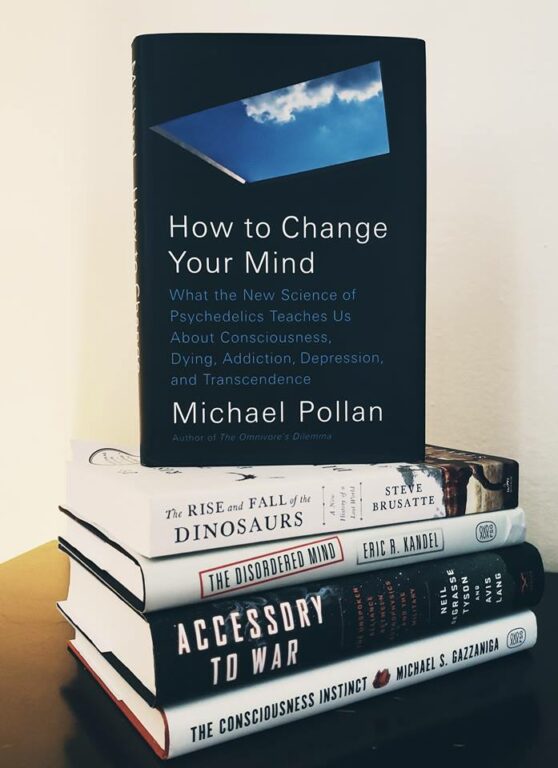It was a solid year for reading non-fiction, especially, science books. Although memoirs and books on Donald Trump ruled the non-fiction bestseller list, some science books were still devoured by many readers across the world. Two thousand eighteen was also the year that saw the posthumous work of famed physicist Stephen Hawkins. From genetics to the links of astrophysics and war, we highlight five great science books in 2018.
Five of the Best Science Books of 2018
5. The Consciousness Instinct by Michael S. Gazzaniga
We already reviewed this book last Sunday. It is still worth noting how great this book is, especially this year. Every time you bring up the topic of consciousness, everyone has an opinion, and you get the feeling that you’re not getting the whole story. The Consciousness Instinct by one of the founders of Cognitive Neuroscience goes in-depth on the history of consciousness, the latest theories and a new way of looking at the Hard Problem.
4. Accessory to War: The Unspoken Alliance Between Astrophysics and The Military by Neil DeGrasse Tyson & Avis Lang.
Last year, everybody’s favorite astrophysicist, Neil DeGrasse Tyson, wowed everybody with his accessible book, Astrophysics for People in a Hurry. Now, in 2018, Tyson gives of a broader piece of work, making the connection between war and his specialty, astrophysics. Tyson goes to every corner in history and gives you a look at how his branch of science has influenced a whole sequence of innovations and in the process, change the world, primarily through war.
3. The Rise and Fall of the Dinosaurs: A New History of a Lost World by Steve Brusatte
The Rise and Fall of Dinosaurs is arguably one of the best books on paleontology, evolution, and history. As Steve Brusatte put it, this is the definitive biography of dinosaurs. Brusetti marvelously describes these prehistoric marbles, while also setting his life experience as a paleontologist up front. The New York Times wrote on the author of this book, “Like Woody Allen’s Zelig, Brusatte is always at the right place at the right time.” If you want to devour complete writing on dinosaurs, you found the right book.
2. She Has Her Mother’s Laugh: The Powers, Perversions, and Potential of Heredity by Carl Zimmer
In 2016, Indian-born American physician, Siddhartha Mukherjee, published the groundbreaking book, The Gene. Now, in 2018, Carl Zimmer gives another detailed writing on genetics. Zimmer explores how we inherit not just from DNA, but other sources, like cells. A history of genetics and epigenetics, with the contributions to many scientific fields and even society, Zimmer’s writes on heredity with a fresh take.
https://www.youtube.com/watch?v=7_xIa7Hs7F8
1. How to Change Your Mind: What the New Science of Psychedelics Teaches Us About Consciousness, Dying, Addiction, Depression and Transcendence by Michael Pollan
Psychedelics had a bad reputation by the closing year of the 1960s. Leave it to journalist and bestselling author, Michael Pollan, to update and break the spell around psychedelics. Pollan brings upfront the story of how psychedelic drugs – some can be found in nature – was a promising field of research, but because of characters like Timothy Leary and Harvard’s Psilocybin Project, it was stopped in its tracks. Pollan explores the powers of psychedelic drugs, especially in therapy, addiction, and depression. Also, it sheds light on how these drugs can alter the brain and shed new light on the mystery of consciousness.
Honorable Mentions
Brief Answers to the Big Questions by Stephen Hawking
Every human on earth tackles these questions in their lifetime, Hawking last writing gives us a glance of what his incredible mind had to offer about the big questions of the universe.
Losing the Nobel Prize: A Story of Cosmology, Ambition, and the Perils of Science’s Highest Honor by Brian Keating
Ever wonder how can someone fail to win the Nobel Prize, primarily when it was almost a reality. Cosmologist, Brian Keating, gives an invigorating account on how the current climate in science, racing for the latest discovery and not giving it enough time for the everyday discoveries, let him and his team, to lose the most important award a scientist can win.
The Disordered Mind: What Unusual Brains Tell Us About Ourselves by Eric Kandel
Nobel laurete, Eric Kandel, came back in 2018 with intriguing writing on the disorders in the mind, their implications and what discoveries are close to finding their cures. There’s no topic that Kandel doesn’t take, here’s a complete review I did about the book.

